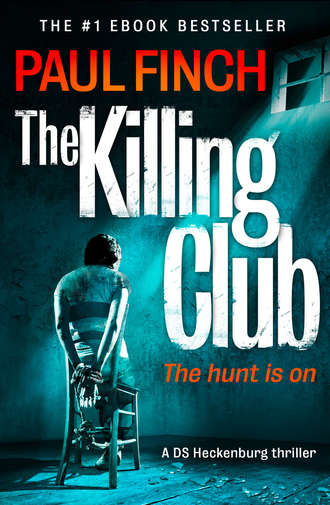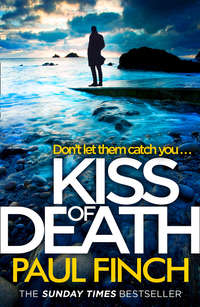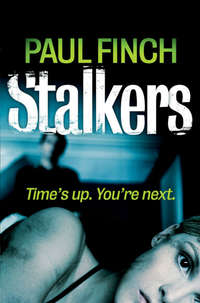
Полная версия
The Killing Club
‘Mind my whips and fucking stottie!’ a voice boomed in his ear.
A chair grated as it was pulled back from the table alongside Heck.
‘Oh … sorry,’ the uniform responsible said, noticing he’d nudged Heck’s arm and slopped his tea – though he didn’t particularly look sorry.
Heck nodded, implying it didn’t matter.
The uniform in question was one of a group of three, all loaded down with trays of food. The other two were younger, somewhere in their mid-to-late twenties, but this one was older, paunchier and of a vaguely brutish aspect: sloped forehead, flat nose, a wide mouth filled with yellowing, misaligned teeth. When he took off his hi-viz waterproof and hung it over the back of his chair, he was barrel-shaped, with flabby, hairy arms protruding from his stab-vest; when he removed his hat, he revealed a balding cranium with a thin, greasy comb-over. He ignored Heck further, exchanging more quips with his mates as they too sat down to eat.
Uniform refreshment breaks wouldn’t normally coincide with lunchtime, which on Division was reserved for the nine-till-five crowd, so this presumably meant the noisy trio had been seconded off-relief for some reason, most likely to assist with Operation Bulldog. Heck relapsed into thought, though at shoulder-to-shoulder proximity it was difficult for their gabbled conversation not to intrude on him, despite the strength of their accents. Heck was a northerner himself. He’d initially served in Manchester before transferring to the Metropolitan Police in London. Even though he’d now been based in the capital for the last decade and a half, there were many ways in which the north still felt more familiar than the south, though the north was hardly small – and Sunderland was a long way from Manchester.
The PC who’d nudged his arm was still holding the floor. Heck could just about work out what he was saying. ‘Aye t’was. Weirdest lad I’ve ever seen, this one.’
‘Ernie Cooper, you say?’ a younger colleague with a straight blond fringe replied.
‘Aye. Bit of an oddball.’
‘You were H2H off Wear Street?’ asked the other colleague, who was Asian.
‘Aye.’
‘Bet you didn’t get much change there?’
‘Wouldn’t think you’d find Ernie Cooper there,’ the older PC added. ‘Two-up-two-down. Bit of a shithole outside. Aren’t they fucking all, but that’s by the by. He answers the door – suit, tie, cardy. Like he’s ready to go to church or something.’
‘I know what you’re gonna say,’ the blond said. ‘It’s inside his house, isn’t it?’
‘Aye.’
‘Was in there last year. Reporting damage to his windows. Bairns chucking stones.’
‘Thought he was off to work, or something,’ the older PC explained, ‘so I says “Caught you at a bad time?” He says, “no, come in.” What a fucking place.’
‘Shrine to World War Two, isn’t it?’ the blond agreed.
Heck’s ears pricked up.
‘Everywhere,’ the older PC said. ‘Never seen as much wartime stuff. And it’s neat as a new pin, you know. It’s orderly. Like it matters to him.’
The blond mused. ‘Bit of an obsessive, I think. His dad, Bert, was a commando or something. Got decorated for bravery.’
It was a simple association of ideas, but Heck had been brooding on his own comments from earlier and the thought processes behind them – ‘they may dress like commandos, but whatever else they are, they aren’t that.’
‘And then there’s that bloody big knife on his living-room wall,’ the older PC added. ‘Enough to scare the crap out of you.’
Heck turned on his chair. ‘Say that again?’
At first the three PCs didn’t realise he was talking to them. When they did, they gazed at him blankly.
‘Sorry … DS Heckenburg. I’m on Bulldog too.’
‘Aye?’ the older PC said, none the wiser.
‘I’ve been attached from the Serial Crimes Unit in London.’
‘Oh aye?’ This was Blondie. He sounded less than impressed.
‘It’s what you were saying about this bloke … Something Cooper?’
‘Ernie Cooper.’
‘His father was a veteran, yeah?’ Heck asked.
‘Was, aye,’ Blondie said. ‘Been dead five years.’
‘How old is the younger Cooper?’
The older PC, who wasn’t bothering to conceal how irked he felt that his meal had been interrupted, shrugged. ‘Late fifties … more.’
‘You know him?’
‘Not well.’
‘Has he got form?’
The older PC frowned. ‘Bit. From way back.’
‘Violence?’
‘Nothing serious.’
‘But now you say he’s got a big knife?’
‘Aye, but it’s not what you think. It’s a wartime memento … something his dad brought home. A kukri knife, you know. Antique now.’
Heck’s thoughts raced. The kukri knife – or khukuri, to be accurate – was that sharp, heavy, expertly curved weapon still used by Gurkha battalions in the British Army. It was infamously well designed to deliver a fatal stab wound, but was also known as a powerful chopping tool. And what was it one of the medical officers who’d examined the three murder victims had recently said? Something like: ‘The lacerations are deep – they’ve gone clean through the muscles of the oesophagus in a single incision. We’re talking a finely honed, but very heavy blade …’
‘Was Ernie Cooper a military man himself?’ Heck asked.
The older guy shrugged. ‘Not that I know of.’
‘Factory worker,’ the Asian PC said. ‘Retired early.’
‘Is he fit?’ Heck wondered. They exchanged glances, now more bewildered than irritated by the protracted nature of the interrogation. ‘What I mean is … can he run? Seriously fellas, this could be important.’
Blondie shrugged. ‘Seen him jogging. Used to be part of the Osprey Running Club, I think … ultra-distance. Probably knocking on a bit for that now.’
‘Nah, I still see him running,’ the Asian PC said. ‘On his own, like. Don’t see him running with anyone else. Never have, to be honest.’
‘And you say his dad was a commando?’
‘Aye …’ Blondie confirmed. ‘Bert Cooper. Well-known character up the East End. War hero like.’
‘Commando?’ Heck said. ‘Don’t suppose you can be any more specific?’
‘He wasn’t a commando,’ the Asian replied. ‘I read his obit in the paper. He was a para. He was in the desert and at Pegasus Bridge.’
‘Aye, Pegasus Bridge,’ Blondie said. ‘That was where he won his medals. Remember my dad saying.’
Heck sat back. ‘I’d like to meet Ernie Cooper, if you don’t mind.’
The older PC shrugged. ‘We don’t mind. Why should we?’ He rummaged in his jacket pocket. ‘Can give you his addy right now.’
‘Might be easier if you were to introduce me to him,’ Heck said. ‘Help break the ice maybe.’
The older PC glanced at his mates as if he couldn’t believe the audacity of such a request. ‘Before or after I’ve had my nosh?’
Heck stood up. ‘I’ll probably need an hour actually. Can you meet me downstairs at two?’
‘Well … suppose I can put this lot away in an hour.’ The older PC indicated his plate, which was piled with chips, eggs, sausage, beans and buttered bread. In less charitable mode, Heck might have commented that considering his bulk, which, now he was seated, bulged over his waistband and utility belt like a stack of tyres, the guy would be lucky to live through the next hour, but that would hardly help.
Besides, his thoughts were now on other things.
Like the Leibstandarte.
‘What?’ Jerry Farthing said – that was the older PC’s name. ‘The Leibstan-what?’
‘Full title … 1st SS Division Leibstandarte,’ Heck said from the front passenger seat of Farthing’s patrol car.
Farthing drove thoughtfully on. ‘Nazis, yeah?’
‘Frontline shock-troops. Total fanatics. Most of them had been recruited from the Hitler Youth when they were still too young to see through the Führer’s bullshit.’
Farthing looked puzzled. Up close, he gave off a faintly sour odour – sweat, unwashed armpits. He hadn’t shaved particularly well that morning; his leathery, pockmarked cheeks were covered with nicks. ‘I’m sure this is leading somewhere … I just hope it’s worth it.’
‘There was one place where we saw the Leibstandarte at their best.’ Heck checked a mass of notes he’d recently scribbled in his notebook. ‘Wormhoudt. A farming area near Dunkirk. That’s where they murdered a bunch of British POWs with machine guns and grenades. Eighty men died … after they’d surrendered.’
‘Nasty.’ But Farthing still looked baffled as to how this concerned him.
‘That was in 1940,’ Heck said. ‘In 1945 it was the other way around. Then, the 1st SS Division were in the rear-guard as Hitler’s forces fell back into Germany. That April, quite a few of them got captured by British airborne forces at Luneburg. Ever heard of Luneburg, Jerry?’
‘Can’t say I have.’
‘Well … if someone else had won the war, it would have gone down as a place of infamy. It’d be regarded as the scene of a notorious war-crime.’
‘I’m guessing we got payback for Wormhoudt?’
‘At least forty members of the Leibstandarte were executed on the spot.’
‘What goes around comes around.’
‘Yeah. It was war. What’s interesting to us, though, is the method of the execution.’
‘Okay …?’
This train of thought hadn’t occurred to Heck straight away on hearing that Ernie Cooper’s father had been a commando in World War Two, or that Cooper himself was a World War Two obsessive. But then the word ‘para’ had been mentioned, and it had jogged Heck’s memory again – this time significantly.
The other thing, of course, was the wire.
‘The British paratroopers who grabbed those SS men made them run the gauntlet,’ Heck said. ‘You know what that means?’
‘Aye. Blokes line up on either side and hit them with rifle butts while they run down the middle.’
‘Rifle butts, spades, trenching tools, anything,’ Heck said. ‘After that – and this is something I knew I’d read about once before – they tied them to posts … according to some accounts, with barbed wire.’
‘Jesus,’ Farthing said. Then the parallel seemed to dawn on him. ‘Jesus! … Are you serious?’
‘Then they cut their throats.’
‘Throats …’ Briefly, Farthing was almost distracted from driving. ‘Okay, there’s a similarity with the way Nathan Crabtree copped it …’
‘More or less with the way they all copped it …’
‘Yeah, but that was probably nothing to do with Bert Cooper.’
‘On the contrary …’ Heck flipped a page in his notebook. ‘Bert Cooper’s unit, the 15th Air Pathfinder Brigade, were implicated. In fact, our Corporal Cooper was one of ten men arrested by the Special Investigation Branch. It was even suggested he did the throat-cutting. He was held for six days while the evidence against him was assessed.’
Farthing had turned a slight shade of pale. ‘And?’
‘He was released on grounds of “battlefield trauma”. Instead of being charged and sent to the glasshouse, he received four months “psychotherapeutic counselling”.’
‘And … where’ve you learned all this?’
‘It’s all in the public domain, Jerry … you have heard of the internet?’
Farthing shrugged. ‘Aye, but … even so.’ He clearly wasn’t enjoying hearing these revelations. ‘What’s it got to do with his son? I mean it’s seventy bloody years ago.’
‘Well for one thing, his son’s still got the knife. Or so you said.’
‘Hang on … we don’t know it’s the same knife. It probably isn’t.’
Heck glanced sidelong at him. ‘Seriously? Why else keep it in a place of honour?’
‘He told me his dad took that knife off a dead Gurkha at Medenine in 1943.’
‘Even if that’s true, doesn’t mean it wasn’t the weapon used two years later on those SS prisoners. Might even have been a kind of poetic justice in that.’
Farthing shook his head. ‘I’m sorry … this is a stretch.’
‘Well, let’s look at Ernie Cooper himself. You told me he’s got form for violence.’
‘Nothing serious.’
Heck flipped another page. ‘Wounding his wife?’
‘That was quite a while ago, wasn’t it?’
Heck read on. ‘1977, to be precise. He actually assaulted her twice that year. On the second occasion, which was so serious that she subsequently left him, he received a two-month prison sentence. In 1979, he served time again, this time six months for threatening to kill members of a local Irish family. Apparently the Irish dad had been mouthing off down the pub about the Warrenpoint massacre of eighteen paratroopers by the IRA, saying it was justice for Bloody Sunday. Ernie Cooper went round that night, banging on their door and windows, threatening to burn the place down while they were all asleep. Two years later, he got locked up again … drew a suspended sentence for assaulting a bunch of CND members who’d tried to lay white poppies at the Cenotaph on Remembrance Sunday.’
Farthing shrugged. ‘Aye, but if that was his last offence … I mean, 1981. It’s no wonder he’s not on our radar.’
‘That was the last time he got arrested,’ Heck said. ‘It wasn’t his last offence. Seems our Ernie’s a bit of a letter-writer. He’s had stuff in all the local rags, having a pop at drug addicts, prostitutes, child molesters and “bad families”, as he calls them. Saying they should all be wiped out, quote, “to make the streets decent again”.’
‘Alright, so he’s a right-wing nutter …’
‘He got cautioned only five years ago for forcibly confiscating some kid’s skateboard because he said it was annoying the whole street. He was also advised after another bunch of kids said he’d called them “dope dealers” and threatened them with a baseball bat.’
‘Okay, I get it. He’s got a temper.’
‘He’s also got a big bloody knife that was once used to murder a number of SS men,’ Heck said. ‘So what do you reckon, Jerry?’
Farthing nodded resignedly. ‘I suppose we can have another chat with him.’
Chapter 3
Time hadn’t made much impact on the Hendon district of east Sunderland.
It mainly comprised rows of age-old terraced housing, scruffy high-rise apartment blocks and the odd derelict industrial unit. A notorious area in law and order terms even during its docklands heyday, now it was largely unemployed, which made things even worse. The street they pulled up in was typical; a single row of houses facing onto a low-lying stretch of overgrown spoil-land cordoned off by a rickety old fence. The house fronts were black with grime, many of their doors dented and battered. It boasted ten dwellings in total and was bookended by two corner shops, which, as far as Heck could see, contained nothing but rubbish.
They parked Farthing’s Vauxhall Astra patrol car opposite number three, alongside the only gate in the fence. As soon as they climbed out, the September breeze took hold of them. There had been squalling rain that morning and the road was still damp, its gutters lined with puddles. Now the sun had emerged, but rags of grey, wind-tossed cloud were strewn across it, absorbing any warmth. There was no one else in sight. No curtains twitched either in the house directly facing them, or in those next to it. No lights were on.
PC Farthing knocked on the front door and waited, while Heck stood behind him. There was no response. The interior lights remained off. Farthing knocked again. Still there was nothing; not a sound from inside.
He glanced at Heck and shrugged. ‘Well … we tried.’
Heck ignored that, crouching at the letter flap and pushing it open. ‘Mr Cooper!’ he shouted. ‘This is the police. Can you open up please?’
Still there was no sound from inside. Heck tried again twice, to no avail, before straightening up.
‘Satisfied?’ Farthing asked.
‘Far from it. If you were under suspicion of murdering three gang members, and the police came round before you’d got a chance to do the rest of them, would you open the door voluntarily?’
‘You can’t be bloody serious … I only spoke to this fella as part of a house-to-house. To ask if he’d seen anything the day Crabtree got chased.’
Heck dug under his jacket and produced a folded document, scanning quickly through it. ‘We’ll never know how much he saw until we check him out properly.’
Farthing’s eyes bugged. ‘Is that … is that a warrant?’
‘No, it’s a beautician’s appointment. Course it’s a bloody warrant.’ Heck tested the front door with both hands, but found it unyielding. ‘This is pretty solid. Let’s try round the back.’ He set off along the pavement.
‘You’ve had a busy lunchtime, haven’t you?’ Farthing said, hurrying to follow.
‘Couldn’t have done it without you, Jerry. Told the beak about Cooper’s track record of political violence.’
‘Political?’
‘Picking on hippies and IRA supporters. Told him about that nasty knife you saw too. I’ll need a statement about that, of course.’
‘Jesus H … I told you that knife was an antique.’
‘A combat knife’s a combat knife, Jerry.’ They turned the corner at the end of the row, and entered a squalid backstreet. ‘Anyway, we’ve got the warrant now … and this is more like it.’
The rear gate to number three was missing from its hinges, revealing a tiny paved yard. Unlike the surrounding environment, this area was cleared and well-swept. A clothes prop was leaning against the coal bunker, with a basket of pegs next to it.
‘I’m not sure about this,’ Farthing said as they entered. There was a rear ground-floor window to the house and a rear door. Both looked to be closed and locked. ‘I don’t like forcing entry, even with a search warrant.’
In response, Heck rapped loudly on the rear door and shouted at the top of his voice. ‘Mr Cooper … we are police officers! This is really quite important! Could you open up please!’ They waited for half a minute. Heck tried again. A further wait brought no reply. Heck glanced at Farthing. ‘The occupier was definitely at home when you called this morning?’
‘Aye … he let me in, gave us a brew.’
‘Okay … well he’s pretty clearly absent now. Would you agree?’
‘Suppose so.’
‘Good.’ Heck put his shoulder to the rear door, and it crashed inward, its rusted lock flying off with the first impact. Inside, the house stood in sepulchral dimness.
‘Mr Cooper, it’s the police!’ Farthing called as they shuffled through a narrow scullery into a small, tidy kitchen. ‘We have a warrant to search these premises!’
There was no reply, but Heck glanced around. ‘Place is immaculate,’ he observed.
‘He’s always a well-turned-out bloke.’
‘Bit like a soldier, eh?’
In the hall, a shoe rack stood close to the door, on which Heck noted two pairs of muddy trainers. A raincoat was draped over the foot of the banister. Aside from these mundane items, this part of the house also looked neat. Its linoleum floor shone, as if mopped regularly. But the real surprise came when they moved sideways into the lounge, which in the past had been knocked through into the dining room to create one large living space, the walls of which had since been completely covered with sepia-toned news cuttings.
Fascinated, Heck’s attention flitted from one headline to the next.
Soviets launch winter offensive
British triumph in desert battle
As he’d heard in the station canteen, this was World War Two. Every aspect of it. But it wasn’t like a temporary display. The thousands of carefully interlocked cuttings here had literally been turned into wallpaper, incorporated into the fabric of the house’s interior. And it was a professional job; there wasn’t a square inch of plasterboard exposed. Heck glanced into what had once been the dining room.
Mussolini snatched from mountain redoubt
Royal Navy enters Pacific
Grainy images had been mounted to create maximum impact: frostbitten German troops surrendering in Russia; British tanks rolling over the sunburned plains of Alamein; U-boat survivors bobbing like driftwood in an oil-filled sea.
In addition, there were four framed black and white snapshots on the mantelpiece, each one depicting the same toothily grinning face: a young squaddie, usually with tousled hair and dust on his cheeks. In one, he’d been photographed in what looked like a desert graveyard, and had a small mongrel dog sitting on his left shoulder. In another he was hefting a Bren gun.
‘I’ve heard about living in the past,’ Heck said. ‘But this …’
‘Fuck!’ Farthing interrupted. ‘The knife’s gone.’
He was standing by the lounge sideboard, where other items of memorabilia were arranged. Two of these were cruciform medals done in black metal with white edging, attached to black, white and red ribbons – Heck recognised them as Iron Crosses, second class. In a glass case on the wall there was a faded red beret, with a silver badge attachment depicting an eagle clutching crossed daggers. Also fixed on the wall, as Farthing now indicated, there was a bent wooden scabbard, bound with black leather and clad at its sharpened tip with slivers of plate metal.
Heck didn’t need to be an expert to recognise the sheath for a khukuri. Though the knife itself was absent, its two smaller cousins – the chakmak and karda, utilised for sharpening the main blade, were still in place.
‘He might just have taken it to get it cleaned, or something,’ Farthing said.
‘That in itself would be a tad suspicious, don’t you think?’
Before Farthing could reply, a shudder passed through the house, and then another, and another. Heavy feet were descending the stairs, and at speed. Heck and Farthing both lurched to the lounge door at the same time, briefly hampering each other. When they finally burst into the hall, they caught a fleeting glimpse of a tall shape in a fawn tracksuit vanishing out through the front door, slamming it closed behind him. Heck reached the door first, but was briefly foxed by its special security lock. He twisted and turned the handle and hit the button repeatedly, all without consequence.
‘Here,’ Farthing said, pushing past.
He managed to get the door open, and they blundered outside.
The street was empty again, but two things struck them simultaneously: the front nearside tyre of the police Astra had been slashed to the ply-cord – as though someone had dealt it a passing blow with a heavy blade; and the gate in the fence opposite was now open and swinging.
‘Shit!’ Farthing shouted, heading across the road to his car.
‘What’s on the other side of that fence?’ Heck replied, going for the gate.
Farthing was now busy filching his radio from its harness. ‘What … oh, wasteland. Industrial wasteland …’
‘Can you get the car round there?’
‘Not without changing the tyre, obviously …’
‘Sod the bleeding tyre!’ Heck ran through the gate. ‘And get us some support!’
On the other side, a beaten earth path wove crazily down a shallow slope, looping between dense stands of Indian Balsam, their September seedpods now loaded to capacity and exploding as Heck barged against them. The path unfurled ahead of him for dozens of yards, but there was no sign of Cooper, which was disconcerting, given that he was in his fifties. Though what was it they’d said about him – that he’d formerly been an athlete? Heck swore under his breath. He’d known fitness fanatic coppers who were still ripped and energetic in their mid-sixties.
He fished his own radio from his pocket as he circled a thicket of hogweed and found himself following a rusty wrought-iron fence. Thirty yards ahead, there was a gap in this; on the other side of that, a muddy lane led beneath a dripping black railway arch. Heck kept running, doing his damnedest not to slip and slide in his leather lace-up shoes.
‘Alpha-Echo control from DS Heckenburg, Operation Bulldog, over?’
‘DS Heckenburg?’
‘I’m pursuing a suspect in the neo-Nazi murders. I could use some back-up, and some geographical guidance, over?’
It was several seconds before he received a response, which was no surprise as the passage under the arch ran forty yards at least. When he re-emerged into the open, Heck found himself on a dirt track strewn with bricks and twists of wire, which led past a broken-down gate onto the forecourt of a nondescript derelict building.







